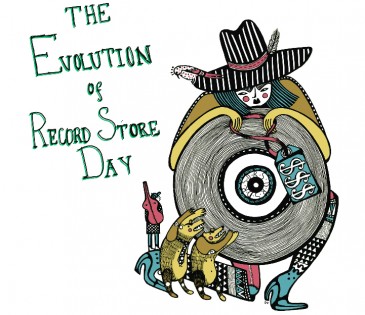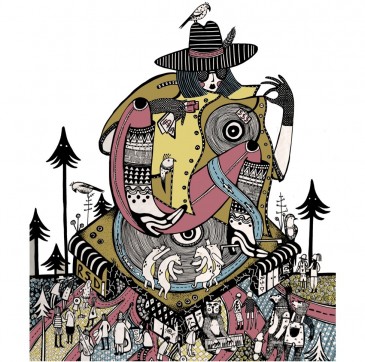
lettering by Kim Pringle
The lineup of denim-clad dudes, hip, stroller-pushing parents, and dreadlocked twenty-somethings clog the sidewalk, the mismatched crowd eagerly anticipating something. Judging by the varied demographics, maybe it’s customer appreciation day at the coffee shop. Maybe the latest iPhone is finally available. Or maybe it’s April 20 outside the local independent vinyl joint, and music lovers from miles around are flocking to take part in Record Store Day’s sixth year.
Happening on the third Saturday of every April, RSD is known for its vinyl sales, live in-store performances, and limited edition album reissues. Since 2007, it has grown from an American grassroots movement into an international event. RSD has become a global celebration and local pulse-check of community and culture.
Independent record stores align themselves with community through their business approach, amongst other things. RSD is often a record store’s most profitable day of the year and the special releases significantly contribute to the influx. Snatching up one-time reissues is a major priority for many collectors, just as selling them is a crucial source of revenue for many struggling stores. Unfortunately, they also have Craigslist profiteers to compete with, who often buy and resell records online for a higher price. Still, business is business right?

Not for most independent record stores in Vancouver. Rob Frith, owner of Vancouver’s oldest surviving record store, Neptoon Records, addresses this issue by explaining the allotment and selling procedure of RSD releases. After placing orders on desired records for the day, the actual percentage of those that arrive is always a surprise. “You can order 25 and only get 2,” he says. This potential shortage is only exacerbated by those who buy multiple copies of limited supply records just to resell them.
Caring more for real music fans than making a buck, Frith explains that Neptoon will hold orders for neither their staff, nor their best customers. Instead, they honour the sacred justice of being first in line. As part of this dedication to fairness, Neptoon also limits sales to one copy of each limited release per person. Most RSD releases end up selling out either way, but implementing these rules still risks sales losses. Maybe it’s rock ‘n’ roll capitalism. Maybe it’s the bonding of art and business. Either way it proves independent record stores side with culture over commerce.
Zulu Records manager Nic Bragg recalls how, “We used to joke that record stores were the first place you checked into in town to find out if there was something going on.” According to Bragg, in both the early days and now, record stores have always functioned as “cultural ambassadors.” Despite their declining urban presence, Bragg has noticed a revival in their overall importance in the past few years. Working at Zulu, he’s seen how people tend to “burn out on streaming music” and accidentally remember what it feels like to interact with a physical piece of music. Since it began in 2007, RSD has helped those people stumble in the right direction.
Although Zulu Records also puts a cap on the number of records customers can buy on RSD, Bragg says over-commercialization is still an issue. He explains, “It’s always hard to measure when something’s too commercial because everything about Record Store Day is commercial, whether it’s indie commercial or major label commercial.” Some of the day’s corruptions, however, are more obvious than others. Bragg discusses how some releases are made for RSD, specifically to be sold on RSD, for RSD-inflated prices. “They’re usually rare, impressive collectors’ style products. They sometimes fall into real fans hands and sometimes they end up on eBay.” The recent piggybacking of RSD onto Black Friday is also a contentious issue that Bragg likens to “arbitrarily deciding to have a Boxing Day in the middle of the year.” Although clearly instigated by major labels, Bragg isn’t too quick to judge. “The record business is tough, so this is just another opportunity to survive.”
The goal on RSD, and perhaps the industry’s implicit survival tactic is, as Bragg says, “to remind people what role music and record stores and brick-and-mortar kinds of businesses have in the community.” Frith’s opinion is similar and both men recall stories of how over the years, customers have become friends, with some of those friends now bringing their kids into the stores. A record store is “kind of a fun meeting place,” Frith summarizes lightly and the relationships that result are perhaps the most sincere example of the importance of record stores.
Although Frith thinks an improvement on the day might come from local bands releasing their own limited edition albums, he’s generally pleased to leave RSD just the way it is. And as our interview concludes, a man comes to the till at Neptoon to buy a Solomon Burke record. The financial transaction ignites a discussion about the soul elements of Burke’s voice. Frith points out his favourite song on the album, and this over-the-counter exchange evolves into far more than just the purchase.
Check out local record stores like Vinyl Records, Highlife Records, Beat Street Records, Audiopile, Red Cat Records, Zulu Records, Zoo Zhop, Neptoon Records, and Dandelion Records, all on April 20! Like last year, the day will be packed with in-store performances from local bands, such as the Evaporators at Neptoon, and crazy album reissues from the likes of Bob Dylan, Elliott Smith, Built to Spill, Titus Andronicus, R. Kelly, Destroyer, and many, many more.

